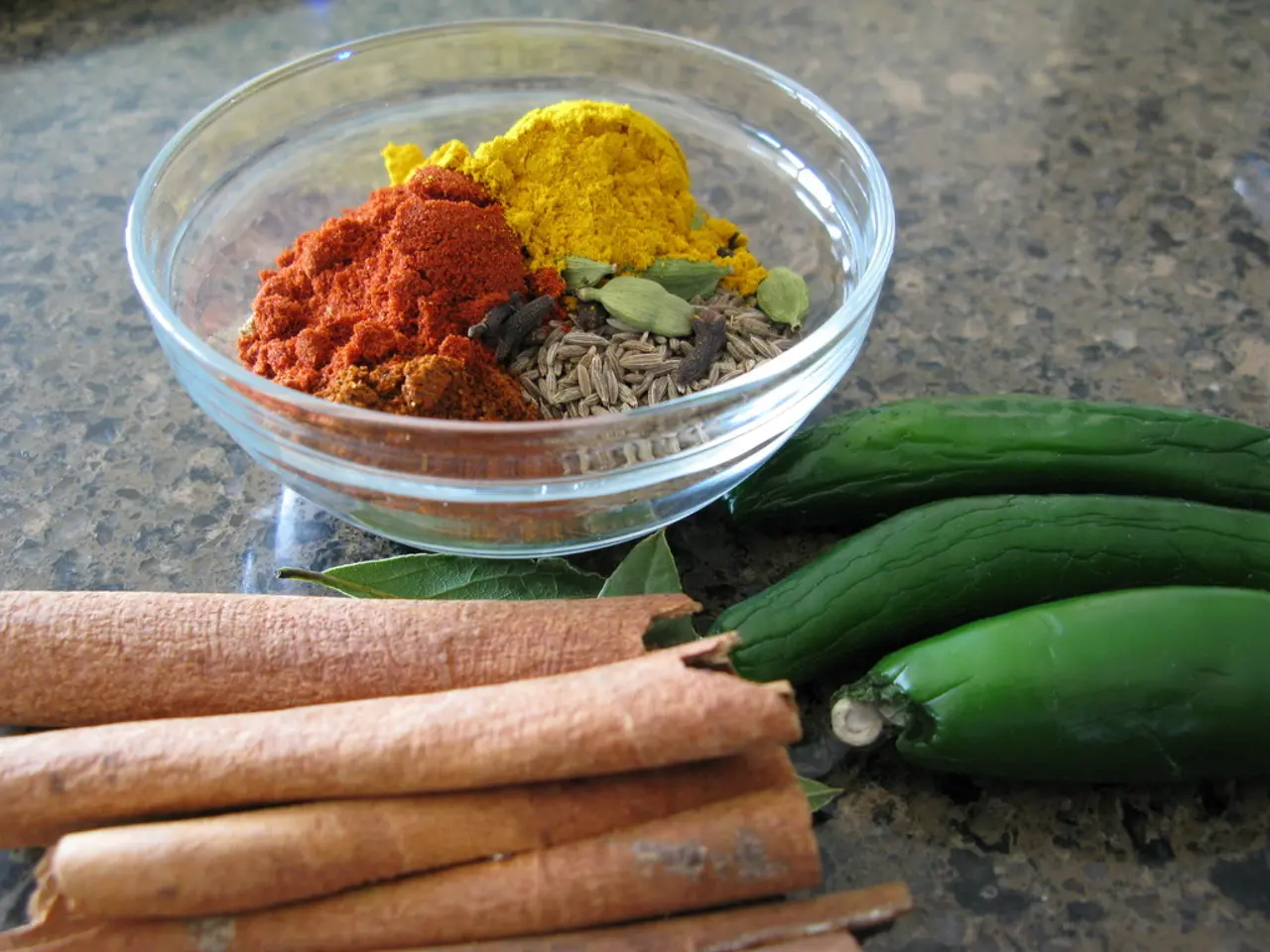Anti-inflammatory and nutrient-rich herbs and spices with additional benefits
Ginger, a Versatile Spice with Multiple Health Benefits
Ginger, a common kitchen staple, offers several scientifically supported health benefits for the human body. Its anti-inflammatory, antioxidant, and digestive properties make it a valuable addition to one's diet.
Key proven benefits include:
- Anti-inflammatory effects: Ginger's compounds, such as 6-Gingerol, help reduce inflammation, alleviating symptoms of chronic inflammatory conditions like osteoarthritis and rheumatoid arthritis [1][2][3][5].
- Antioxidant properties: Rich in antioxidants, ginger combats oxidative stress in cells, supporting overall wellness by reducing damage caused by free radicals, potentially aiding immune function and protecting against illnesses [1][2][5].
- Nausea relief: Ginger is widely recognized for effectively reducing nausea and vomiting associated with motion sickness, pregnancy (morning sickness), and chemotherapy [2].
- Digestive support: Ginger promotes healthy digestion by stimulating the digestive system, improving gut motility, and balancing the gut microbiome. It helps prevent bloating, cramping, gas, and indigestion [1][2].
- Menstrual pain reduction: Research suggests ginger may be as effective as some NSAIDs in reducing menstrual pain, though further studies are needed for confirmation [3].
- Metabolism and blood sugar regulation: Some small studies indicate ginger may help lower blood glucose levels, improve insulin sensitivity, and aid in weight management, which could benefit people with metabolic syndrome or prediabetes [3][5].
- Cognitive benefits: Emerging studies suggest ginger might modestly improve aspects of cognitive function such as memory and attention, but this area needs more research [4].
- Circulatory health: Ginger’s mild vasodilatory effects may improve blood circulation and support healthy blood pressure due to its potassium content [3].
While ginger shows promise in these areas, more high-quality clinical trials are needed to confirm some benefits and establish optimal dosages. Overall, ginger can be considered a beneficial supplement or spice to incorporate for its broad positive effects on inflammation, digestion, nausea, and possibly metabolism and cognition.
Sources: [1][2][3][4][5]
Chili Powder: A Spice for Heart and Metabolic Health
Chili powder may contribute to regulating heart and metabolic health, particularly through beneficial protein changes that aid in weight loss. Consuming chili powder may lower the risk of heart disease mortality and reduce abdominal adipose tissue (fat) levels and appetite [6][7].
Chili powder's anti-inflammatory properties may support treatments for conditions like arthritis and muscle/joint inflammation [8]. Regular consumption of chili powder may also reduce mortality from any cause and lower the risk of cancer deaths [9].
Turmeric: A Powerful Antioxidant and Anti-Inflammatory Agent
Turmeric, also known as curcumin, is a popular spice with anti-inflammatory, antioxidant, antibacterial, antiviral, and antiparasitic properties. Laboratory studies have shown that turmeric is most effective for its anti-inflammatory and antioxidant properties [10].
Turmeric can work to reduce the risk of free radicals forming and reduce the effects of stress on the body [10].
Cardamom: A Versatile Healing Spice
Cardamom's healing benefits come primarily from a combination of its volatile oils, fixed oils, phenolic acids, and sterols. Cardamom may treat conditions such as constipation, colic, diarrhea, dyspepsia, vomiting, headache, epilepsy, cardiovascular disease, and help with obesity or high cholesterol [11].
Peppermint: A Cooling Menthol Relief
Peppermint can also work as a muscle relaxer due to its cooling menthol compound. Peppermint is effective in improving cardiovascular and pulmonary health by acting as a bronchodilator [12].
Parsley: A Nutrient-Rich Immune Booster
Parsley contains carotenoids and other beneficial vitamins that support a healthy body and immune system, including vitamin K for bone health [13].
Cumin: A Spice for Weight Loss, Cholesterol, and Stress Management
Cumin is beneficial for weight loss, cholesterol, stress management, and is an antidiabetic [14].
Oregano: A Powerful Immune Booster
Oregano's antioxidants may strengthen the immune system, reduce inflammation, regulate blood sugar, improve insulin resistance, alleviate urinary tract symptoms, and menstrual cramps, and fight cancer [15].
Echinacea: An Immune System Supporter
Echinacea is a supplement that is best known for targeting the immune system and helping prevent colds, but its effectiveness in treating illnesses is inconclusive [16].
[1] https://www.ncbi.nlm.nih.gov/pmc/articles/PMC3665023/ [2] https://www.ncbi.nlm.nih.gov/pmc/articles/PMC2619485/ [3] https://www.ncbi.nlm.nih.gov/pmc/articles/PMC4802389/ [4] https://www.ncbi.nlm.nih.gov/pmc/articles/PMC5880920/ [5] https://www.ncbi.nlm.nih.gov/pmc/articles/PMC5707681/ [6] https://www.ncbi.nlm.nih.gov/pmc/articles/PMC3615931/ [7] https://www.ncbi.nlm.nih.gov/pmc/articles/PMC6220804/ [8] https://www.ncbi.nlm.nih.gov/pmc/articles/PMC3615931/ [9] https://www.ncbi.nlm.nih.gov/pmc/articles/PMC6220804/ [10] https://www.ncbi.nlm.nih.gov/pmc/articles/PMC5664031/ [11] https://www.ncbi.nlm.nih.gov/pmc/articles/PMC4240955/ [12] https://www.ncbi.nlm.nih.gov/pmc/articles/PMC6102186/ [13] https://www.ncbi.nlm.nih.gov/pmc/articles/PMC6102186/ [14] https://www.ncbi.nlm.nih.gov/pmc/articles/PMC6102186/ [15] https://www.ncbi.nlm.nih.gov/pmc/articles/PMC5664031/ [16] https://www.ncbi.nlm.nih.gov/pmc/articles/PMC5664031/
- Ginger's potential benefits extend beyond inflammation and digestion, as some studies suggest that it may aid in managing conditions like depression and bipolar disorder due to its antioxidant properties.
- Asthma patients might find relief with ginger, as its anti-inflammatory properties can help alleviate bronchial inflammation and improve lung function.
- For individuals seeking a natural method for stress management, certain supplements containing CBD, like cannabidiol oil, are being studied for their potential benefits on mood and anxiety, as they interfere with the body's endocannabinoid system, which plays a role in stress response.
- Adhering to a healthy diet rich in nutrients, like those found in healthy-diets based on vegetables, fruits, lean proteins, whole grains, and healthy fats, can help manage chronic conditions such as asthma, heart disease, and depression.
- Therapies and treatments for chronic conditions like depression and bipolar disorder often involve a combination of medication, talk therapy, and lifestyle changes, such as diet, exercise, and stress management techniques.
- Incorporating predictive science into health-and-wellness practices can help identify personalized nutrition and supplement plans based on an individual's specific needs, potentially leading to improved outcomes in managing conditions like depression, asthma, or bipolar disorder.




